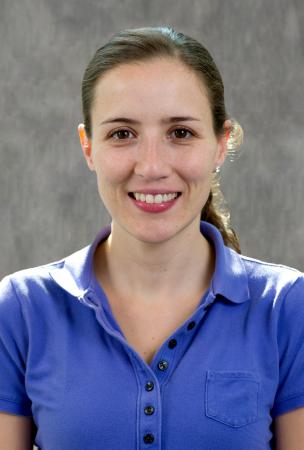Dr. Adriana San Miguel, a postdoctoral associate in the School of Chemical & Biomolecular Engineering under the supervision of Dr. Hang Lu, has been awarded a K99/R00 Pathway to Independence Award by the National Institutes of Health. With a proposed total budget of $927,000, her project is titled, “Elucidating synaptic regulators via high-throughput morphological characterization.” Using the nematode Caenorhabditis elegans as a model, the proposed work aims to understand how synapses (connections between neurons in our brain) are shaped by environmental and activity-dependent factors.
The K99/R00 Pathway to Independence Award is an award given by NIH to postdoctoral scientists to support their transition into an independent faculty appointment. This award provides support for a one- to two-year postdoctoral mentored phase and a successive three-year independent phase as a principal investigator. The main objective of this grant is to support promising scientists in the early stages of their career and accelerate their transition to an independent research position.
This competitive award is one of the few available for non-U.S. citizens and is a great complement for prospective faculty candidates. Current faculty members of the Georgia Tech community who have won this award include Dr. Brandon Dixon (Mechanical Engineering) and Dr. Matthew Torres (Biology).
After completing undergraduate studies in chemical engineering at Monterrey Institute of Technology (ITESM) and working in industry for a couple of years, Adriana moved to the United States from her native Mexico to pursue a graduate degree at Georgia Tech. She completed her Ph.D. in chemical and biomolecular engineering under the supervision of Dr. Sven Behrens, working on stimulus-responsive microcapsules and emulsions. She is now a postdoctoral fellow in Dr. Hang Lu’s lab, where she and others work on integrated engineering systems to perform high-throughput experiments with the nematode C. elegans to answer biological questions that cannot be addressed with conventional methods. Tools developed in the Lu lab, including microfluidics, machine learning and hardware automation, allow unbiased quantitative multidimensional characterization of micron-sized synaptic sites in large animal populations.
Media Contact
Katie Brown
School of Chemical & Biomolecular Engineering
(404) 385-2299
news@chbe.gatech.edu
Keywords
Latest BME News
Jo honored for his impact on science and mentorship
The department rises to the top in biomedical engineering programs for undergraduate education.
Commercialization program in Coulter BME announces project teams who will receive support to get their research to market.
Courses in the Wallace H. Coulter Department of Biomedical Engineering are being reformatted to incorporate AI and machine learning so students are prepared for a data-driven biotech sector.
Influenced by her mother's journey in engineering, Sriya Surapaneni hopes to inspire other young women in the field.
Coulter BME Professor Earns Tenure, Eyes Future of Innovation in Health and Medicine
The grant will fund the development of cutting-edge technology that could detect colorectal cancer through a simple breath test
The surgical support device landed Coulter BME its 4th consecutive win for the College of Engineering competition.








